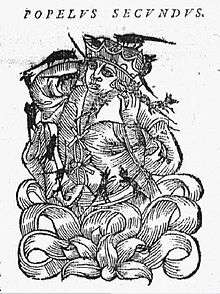Popiel

Prince Popiel ІІ (or Duke Popiel) was a legendary 9th century ruler of the West Slavic ("proto-Polish") tribe of Goplans and Polans, the last member of the pre-Piast dynasty, the Popielids. According to the chroniclers Gallus Anonymus, Jan Długosz and Marcin Kromer, as a consequence of his bad rule he was deposed, besieged by his subjects, and eaten alive by mice in a tower in Kruszwica.
As the legend goes, Prince Popiel was a cruel and corrupt ruler who cared only for wine, women, and song. He was greatly influenced by his wife, a beautiful but power-hungry German princess.[1] Because of Popiel's misrule and his failure to defend the land from marauding Vikings, his twelve uncles conspired to depose him; however, at his wife's instigation, he had them all poisoned during a feast (she might have done it herself). Instead of cremating their bodies, as was the custom, he had them cast into Lake Gopło.
When the commoners saw what Popiel and his wife had done, they rebelled. The couple took refuge in a tower near the lake. As the story goes, a throng of mice and rats (which had been feeding on the unburnt bodies of Popiel's uncles) rushed into the tower, chewed through the walls, and devoured Popiel and his wife alive. Prince Popiel was succeeded by Piast Kołodziej and Siemowit.
On the shore of Lake Gopło stands a medieval tower, nicknamed the Mouse Tower; however, it cannot be the site of the events described in the legend as it was erected some 500 years thereafter.
Cultural references
According to the official art book for the game,[2] The Witcher 3 mission "A Towerful of Mice" is based on the story of Popiel.
See also
- Mouse Tower - a similar legend about the cruelty and demise of Hatto II (Archbishop of Mainz).
- An Ancient Tale (novel) - novel by Polish writer Kraszewski
References
- ↑ Popiel's wife is sometimes called Ryksa (Hilderyka, or Brunhilda); however, her name was never specified by medieval chroniclers (see: Historya narodu polskiego, Volumes 3-4. By Adam Naruszewicz, 1836. Chapter "Podług rękopisma Puławskiego")
- ↑ Batylda, Marcin (2015). The Witcher 3: Wild Hunt Artbook. p. 31.
External links
- The Pomeranian and Kujawy Province
- The Old Tale: When the Sun Was God (Polish film about Prince Popiel.)
- Popiel (Website summarizing information from medieval chronicles.)